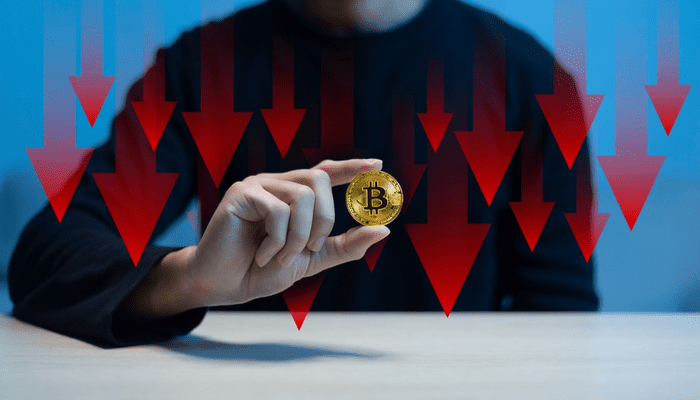
If you have a friend who’s “into crypto”, then now is the time to check in on them. In late January, values of Bitcoin and Ethereum, two of the most prominent cryptocurrencies, dropped to levels that many experts never imagined, and memecoins like Dogecoin were dragged down with them. Countless folks have watched thousands of pounds disappear before their eyes.
This was a rapid jolt rather than a steady burn. Bitcoin reached an all-time high of over $69,000 (£50,850) in November, but then plummeted over 40 percent within a few months. As a result, the crypto market has declined in value by more than $1 trillion (£737bn) since Bitcoin’s peak, but it has shown indications of rising in the last week or two.
Many experts have praised crypto as a democratised form of Wall Street investing, with the potential of financial elevation awaiting everyone who dares to join the party. But in reality, it seems to have panned out for only a chosen handful. Many crypto-investors are ordinary folks taking a risk with their life savings rather than elite traders who can swallow quick losses. A recent CNBC study of 750 crypto investors discovered that a third actually knew very little about what they were investing in. The question is: What happens to these people when they lose big?

Experts like Peter Klein, a cognitive behavioural psychotherapist who offers CBT for cryptocurrency-related mental health difficulties, have cautioned that the market drop will have produced a “increase in the severity of the crypto addiction symptoms that people are experiencing”. It looks that this fast-growing investor group is causing its own fast-growing mental health issue.
Hashim Yasir, 19, is an NFT project founder and crypto trader who lost “a substantial amount of money” in the latest crisis. He tells VICE that it harmed his mental health for some time: “[Up until then] I felt like I was finally getting quite confident with this new talent, but it actually felt like the market was officially going to drop to zero.”
His activities with crypto and NFTs resulted in “sleepless evenings and continual tension and anxiety.” It impacted the way he acts and interacts with other people and “has led to me becoming quite short-tempered,” he told VICE.
Contrary to the frequent statements that investment is an everyman route to prosperity and happiness, respondents told me that bitcoin had nearly ruined their life.
Sandip Das, 27, is an India-based trader who gets his money by shorting Bitcoin — in other words, betting against the market. He’s gained from the downturn in crypto, but he thinks the past year of trading has nonetheless taken its toll.
“I barely sleep three to four hours a day, which leads in my making big errors in the market,” he says. “I’ve also started having soreness at the back of my neck and shoulders owing to excessive levels of stress.” Das suffers bipolar disorder, and says crypto has been challenging for his mental health. “Crypto will wreck you mentally and physically,” he says. “You will become scarred for life.”
One man – a 33-year-old from Russia, who asked us not to share his identity – told me he feels addicted to crypto, and is locked in a cycle of attempting to recover his losses but only losing more in the process.

He originally began investing in November 2017 – the year Bitcoin witnessed a massive increase – and saw some returns, but has now lost his whole life’s savings, totalling £110,000. “Mentally, it’s sickening, since I have not been able to even communicate this with my wife,” he says. “I’m in a low state financially and it isn’t the state I want to be in. It’s devastated my world and my mental health… I’ve reached a stage of attempting to commit suicide.”
Despite the extreme stress felt by some crypto investors, finding a venue to express these experiences isn’t easy. Across Reddit and Twitter debates about bitcoin, there’s usually one reply to downturns: “Don’t be an anxious bitch, HODL [Hold on for Dear Life]” — in other words, don’t you dare withdraw out. Memes routinely circulate that jest about the severe tension and pain that come with investing.
The desire to put on this brave face could be down to the fact that articulating your fear has a direct impact on the markets, which are fundamentally a reflection of confidence. Coins move higher the more people invest and plummet the more people pull out. Crypto might be anxiety-inducing, but people don’t gain money from acknowledging this and actually lose out if they do.
Klein, one of a handful of experts providing counselling for bitcoin addiction, began delivering this sort of therapy in 2017. He usually treats men and has patients all across the world. He thinks they come to him due of the heightened need and the distinct lack of adequate mental health help.
“Very often persons that trade cryptocurrencies excessively – i.e. every day – often already have issues with anxiety,” he stated. “When people experience anxiety, they see the world in a more intense way than people without it. And the intensity of the bitcoin market kind of reflects the reality of how people process the world.”
Like any addiction, crypto can provide people an escape from the reality and a short-term dopamine rush at the expense of everything else in their lives. Klein tries to help his patients by persuading them to quit avoiding other elements of their lives, such as getting dressed or socialising. He draws on counselling methods from behaviourism, classical CBT, and current approaches like mindfulness, to get patients to a more stable position.

One businessman and investor from London – who likes to be known by his Twitter name @BritishHodl – claims that seeing a therapist has helped him understand his anxiety and how to manage the emotional instability of investing. The incident made him recognise that “when you are so focused on markets, and you are an investor, that volatility tends to bleed into everything else,” such as relationships and work. “That’s what you’ve got to be aware of, else you’ve wasted your life,” he says.
What about individuals who struggled throughout the crash merely due to their financial losses? The suggestion of Adam Smith, an investor and creator of advice site The Crypto Advisor, is to “take a deep breath, have diamond hands, and HODL”. He explains: “The immediate future for Bitcoin, and the crypto market as a whole, is likely to continue to be tumultuous while a number of geopolitical and regulatory choices remain unresolved.”
Potential unrest in Ukraine, as well as discussions of a ban on the usage and mining of cryptocurrencies in Russia, are expected to disrupt the market even further. “If you’ve invested your wealth into crypto and you’re now seeing its value drop, it can be a really uncomfortable time, especially if that money is needed elsewhere,” Smith concedes.
HODL has become a joke in the crypto industry, yet that’s exactly what so many investors are trying and failing to do with their psychological wellbeing. Experts claim crypto will eventually bounce back – as it often tends to do – but you have to worry just how much harm will be done to the lives of its investors before it does.
Read More Like This Here





